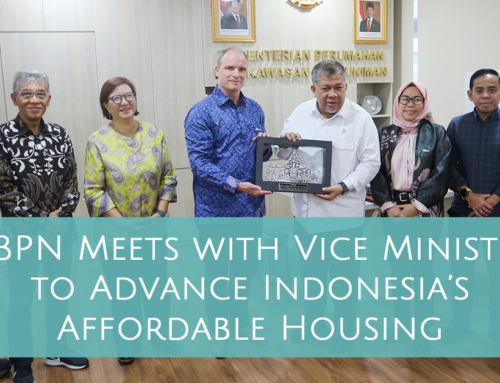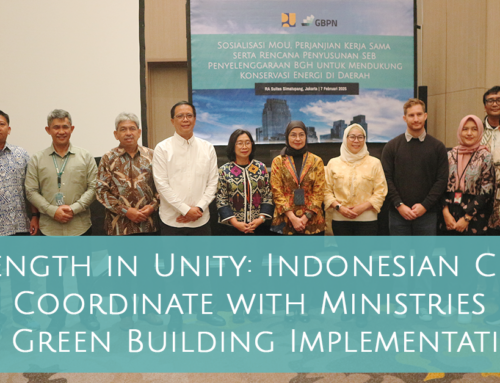Samarinda: Implementing Energy efficient Buildings
Samarinda has taken the next step towards achieving decarbonised buildings by progressing an implementation plan for its landmark Mayoral Decree. A team from GBPN is supporting the Government of Samarinda to develop a technical guideline for implementing Mayoral Decree 55/2021, which was the first set of green building regulations established outside of Java.
This new implementation project brings to fruition support provided by GBPN to the City Government of Samarinda in the development phase of the regulation in 2021.
 Yeni Indra, GBPN Sub-National Strategic Projects Lead, Indonesia, said the Mayoral Decree was an important step towards a more sustainable city of Samarinda.
Yeni Indra, GBPN Sub-National Strategic Projects Lead, Indonesia, said the Mayoral Decree was an important step towards a more sustainable city of Samarinda.
“We are helping make real change happen by developing a technical guideline to implement the regulation effectively,” she said.
“This will ensure that this regulation will not simply live on paper but will deliver real change to the way the building sector operates.”
GBPN is directly working with the city government of Samarinda. The Public Works and Spatial Planning Agency of Samarinda City (PUPR) is the key agency leading this process.
The Mayor of Samarinda, Dr H. Andi Harun, said the GBPN project was a key step in developing implementable energy-efficient building policies.
“In accordance with the Vision and Mission of the City of Samarinda to create a city with a safe, comfortable, harmonious and sustainable environment, we feel the need to implement policies for energy and water savings. This Mayoral Decree is proof that the City of Samarinda takes the role and responsibility so that Indonesia can achieve the NDC target,” Dr Harun said.
Mr Muhammad Cecep Herly, ST. MT, the Head of Department of Human Settlements city of Samarinda said it is very important to develop technical standards for effective implementation of the Samarinda Mayor Regulation.
“To support the national government’s plan both at the Ministry of Public Works and Housing and in the Ministry of Energy and Mineral Resources to save building energy and water, it is very important for the Samarinda Mayor Decree no. 55/2021 to be implemented properly,” Mr Cecep said.
“Therefore, to enforce implementation, we need to develop technical standards and conduct socialisation and training to all the stakeholders in the building sector in Samarinda City.”
Awareness is essential for successful policy implementation
 Matthieu Caille, GBPN Project Consultant, said there are some challenges to implementing sustainable policies in the built sector.
Matthieu Caille, GBPN Project Consultant, said there are some challenges to implementing sustainable policies in the built sector.
“Regulations are generally perceived as technically difficult and economically unviable. Part of it is due to the absence of comprehensive and factual explanations backing up the suggested interventions,” Mr Caille said.
Highlighting GBPN’s solution to this problem, Mr Caille added, “GBPN is supporting the effective implementation of the Mayoral Decree by developing technical guidelines. We rely upon a data driven and evidence-based approach to ensure that the solutions that we are suggesting will be easily adopted due to their relevance from a technical and financial point of view.”
“Involving the key stakeholders from the beginning of the development of the guidelines allows us to understand the improvement opportunities in terms of energy usage and CO2 emissions, as well as identify the capacity and training needs to ensure their effective implementation ”
Ms Indra said that the team will also hold Focus Group Discussions (FGD) for Stakeholder Engagement to take feedback on the implementability of the guidelines.
“Once we have the draft implementation guideline ready, we will conduct FGDs with key stakeholders from the building sector in Samarinda, including government, private sector, NGOs, universities and others,” Ms Indra said.
“Through this process we also want to make stakeholders aware that implementing energy-efficient building practices is not expensive if you have the technical know-how to do it.”
A best practice guide for other cities
Ms Indra said Samarinda was the first city outside Java to adopt the energy-efficient buildings initiative.
“Many of the Indonesian cities have a similar characteristic with Samarinda. Samarinda is also one of the neighbouring cities of the new capital. These conditions bring about better opportunities for replication and adoption of similar initiatives in other cities across Indonesia ,” she said.
“The Mayoral Decree Implementation Guideline has the potential to become a best practice guide for other cities looking to implement sustainable buildings. The guidelines will be easily replicable in other Tier III cities.”
Mr Caille added, “Considering Indonesia’s current energy and electricity mixes, as well as construction common practices, the building supply chain is still carbon intensive and presents plenty of mitigation opportunities. Net-zero buildings will play a key role in reaching NDC targets.”
Share This Story, Choose Your Platform!
Stay in touch with how we’re transforming the buildings sector
GBPN runs innovative building policy reform programs in key regions around the world that aim to tackle the climate emergency by decarbonising the buildings sector. Stay up to date with our newsletter.
Stay in touch with how we’re transforming the buildings sector
GBPN runs innovative building policy reform programs in key regions around the world that aim to tackle the climate emergency by decarbonising the buildings sector. Stay up to date with our newsletter.







